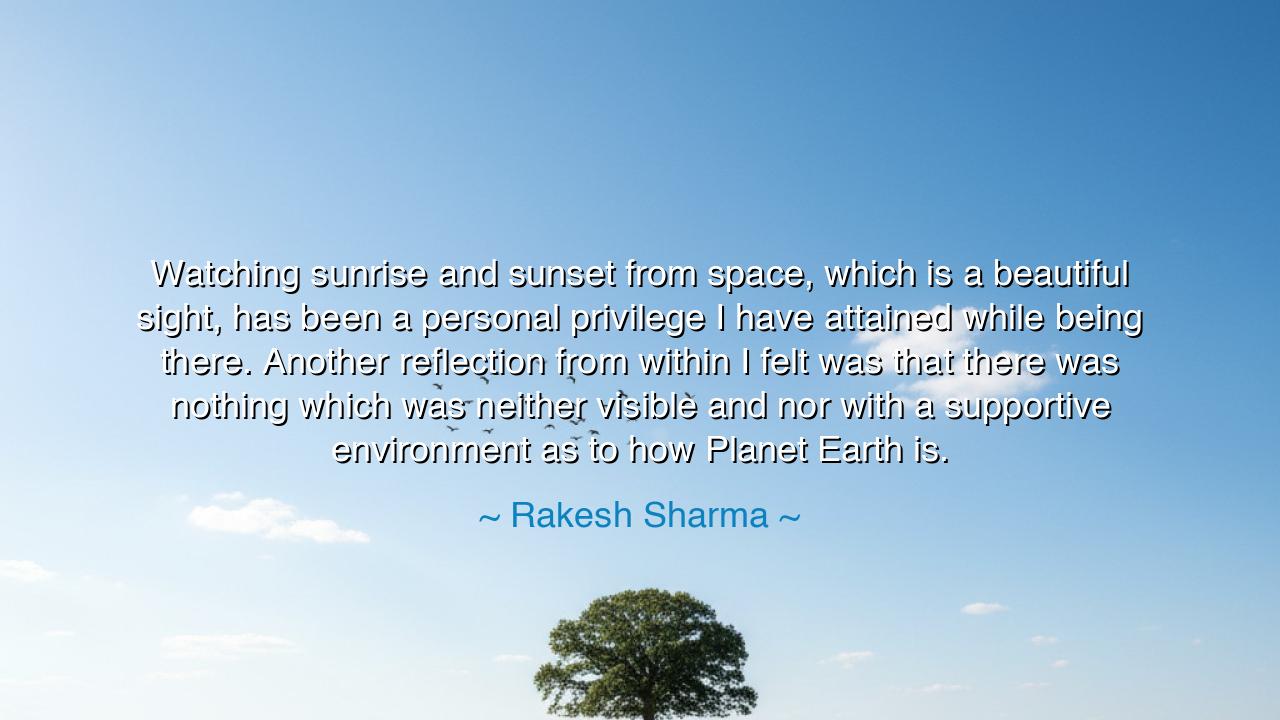
Watching sunrise and sunset from space, which is a beautiful
Watching sunrise and sunset from space, which is a beautiful sight, has been a personal privilege I have attained while being there. Another reflection from within I felt was that there was nothing which was neither visible and nor with a supportive environment as to how Planet Earth is.






Rakesh Sharma, the first son of India to journey beyond the sky, once spoke with the awe of one who had seen creation from a height few mortals attain: “Watching sunrise and sunset from space, which is a beautiful sight, has been a personal privilege I have attained while being there. Another reflection from within I felt was that there was nothing which was neither visible and nor with a supportive environment as to how Planet Earth is.” These words are not only the testimony of an astronaut—they are the chant of a pilgrim who gazed upon eternity and returned with reverence for the fragile home of mankind.
For from the void of space, the Earth reveals herself not as many nations, but as one shining orb, clothed in blue, wrapped in the thin veil of atmosphere. To behold the sunrise and sunset from such a vantage is to see fire and glory like no eye on land can ever fully know. Yet even in that beauty, Sharma’s heart was drawn to the realization that nowhere else in the cosmos, not in the barren craters of the Moon nor the endless black of the heavens, was there the breath of life, the tender environment that nurtures us. What he saw was both wonder and warning: the beauty of the universe, and the irreplaceability of Earth.
The ancients, though they never left the planet, understood this in their own way. They revered the Earth as mother and sky as father, knowing that their lives depended upon the gifts of soil, air, and water. The Egyptians bowed to the Nile, the Greeks honored Gaia, the Hindus sang hymns to Prithvi. They sensed, without rockets or telescopes, the truth Sharma declared after flying among the stars: that Planet Earth is singular, the only sanctuary where humanity may rest.
Consider also the tale of Apollo 8, the mission that gave the world the photograph “Earthrise.” When the astronauts beheld our planet rising over the gray desert of the Moon, they were struck silent. Hardened men of science, trained for calculation, found themselves in prayer. And when that image was shown to the peoples of Earth, it sparked the birth of the environmental movement, for all could now see what Sharma too affirmed: in the vastness of space, there is no other refuge like this fragile globe.
The lesson of Sharma’s words is therefore clear: do not take for granted the privilege of living on this rare oasis. While the stars may inspire dreams, it is here, on this Earth, that life blossoms. To waste its resources, to poison its rivers, to cut down its forests without thought, is to betray not only the generations to come, but the miracle that sustains us all. The astronaut’s vision is not for himself alone—it is for all mankind to heed.
Practical action flows from this vision: care for the Earth as you would for your own body, for it is the body of all humanity. Plant trees, guard water, reduce waste. Support those who seek to heal the environment rather than exploit it. And above all, remember that your space in this world is not given for endless taking, but for stewardship. The sunrise Sharma beheld from orbit is the same that warms your face each dawn—do not let that gift be squandered.
So let his words ring as a teaching for future generations: the beauty of the universe is vast, but beauty without breath is barren. Only Earth gives both wonder and life. Therefore, honor her, protect her, and cherish her, for there is no second home awaiting us in the stars. And when you see the sunset, let it remind you of what he saw from the heavens—that beyond all division, beyond all pride, this planet is our only sanctuary. And to guard it is the noblest duty of humankind.






AAdministratorAdministrator
Welcome, honored guests. Please leave a comment, we will respond soon